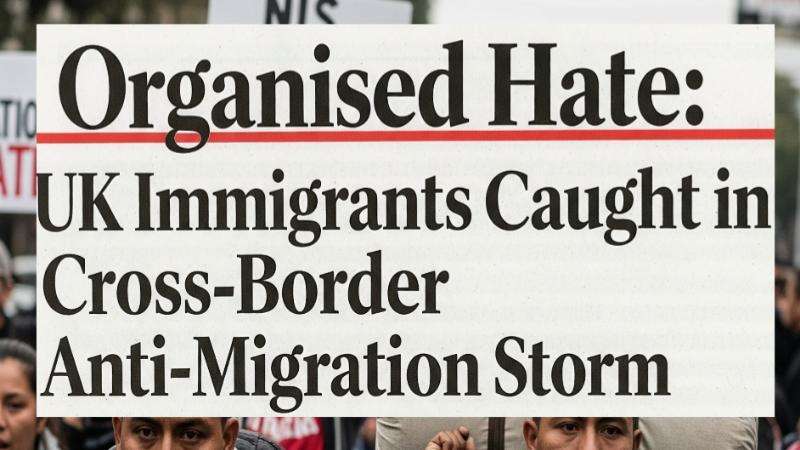A recent photo, posted innocently enough by headteacher Katharine Birbalsingh of her Michaela Community School class on X (formerly Twitter), has ripped open the festering wound of modern racism in Britain, exposing a disturbing shift from veiled prejudice to an open, defiant ugliness. The image, predominantly featuring Black and Asian children, ignited an inferno of over a thousand hostile responses, laying bare a virulent strain of nativism that is no longer content to lurk in the shadows, Daily Dazzling Dawn understands.
"This photo should strike fear into the heart of all Englishmen,” thundered one comment. “Why are they all foreigners?” demanded another, while a third chillingly claimed, “You are literally teaching children that genocidal replacement is good, so long as it’s white people being replaced.” The onslaught, primarily from the far-right and hardcore racists, targeted not just the children, but Birbalsingh herself, who was condemned as an “invader.”
Birbalsingh, known as "Britain's strictest headmistress" and a figure often criticized by the left for her conservative views, found herself bewildered by the sheer volume and intensity of the racist backlash. "Racists always existed," she wrote, reflecting on the grim reality, "but things are much, much worse now." Her observation begs the critical question: what is it that has become so much worse?
From Subtlety to Shouts: The New Face of Prejudice
The racism Birbalsingh encountered elicits little public sympathy. Opinion polls consistently show that the majority of Britons define Britishness by respect for laws and institutions, not by ancestry. Yet, a vocal and increasingly emboldened minority is pushing a narrative steeped in racialized fear. Douglas Murray, the Spectator’s associate editor, points to the fact that in many boroughs, "white Britons" are now in a minority. Novelist Lionel Shriver has even suggested that Britons are being "forced to abet incursions by foreigners so massive that the native-born are effectively surrendering their territory," a process she disturbingly labels "biologically perverse."
These claims, when challenged, are often met with accusations of being out of touch or advocating for "open borders." While legitimate debates about immigration numbers and border controls exist, the current lamentations over "white decline" transcend mere concerns about immigration. They are, at their core, an attempt to transform anxieties about demographic shifts into existential fears about national and racial identity.
Echoes of the Past, Amplified in the Present
This isn't a new phenomenon. Britain has a long and uncomfortable history of such racialized anxieties. The 1905 Aliens Act, for instance, aimed at barring Jewish refugees fleeing pogroms, saw Prime Minister Arthur Balfour claim that without the law, British "nationality would not be the same." Half a century later, the Colonial Office fretted over a "large coloured community" weakening "the concept of England or Britain." Historically, these existential fears have dissipated, only to be resurrected by a new generation. Who today, outside of hardline antisemites, would argue that too many Jews undermine British nationality? Yet, the pattern repeats.
Most mainstream conservatives would publicly reject the overt racism leveled at Birbalsingh's class. However, the troubling reality is that it’s not a giant leap from mainstream arguments about a distinct "white identity" or "white decline" to viewing a classroom of diverse British children as a collection of "foreigners." The unwillingness or inability of many to acknowledge this connection reveals a dangerous blind spot.
Even Birbalsingh herself, in a discussion on X, denied the link between mainstream white identitarian arguments and the racism she faced, insisting that such arguments were “not unreasonable” and placing the blame on “leftist dogma.” It is true that some on the left's perceived abandonment of class politics for identity politics may have inadvertently created a vacuum, allowing racists to rebrand their ideology as a defense of "white identity." And the disdain some sections of the left have shown for the working class has undoubtedly pushed many towards the radical right. However, the persistent denial by conservatives of how mainstream white identitarian narratives pave the way for open racism highlights a profound and dangerous level of intellectual blinkeredness.
The Peril of Racialized Dogma
The dogmatic embrace of demographic change and "white decline" as a singular explanation for Britain's complex social ills is not just problematic; it is profoundly dangerous. It not only normalizes racialized ideas, dragging them into the mainstream, but it also actively obstructs genuine efforts to address the true root causes of Britain's societal challenges. Until the uncomfortable connections between seemingly "mainstream" anxieties and overt racism are confronted, Britain risks a continued and increasingly vocal slide into a divisive and prejudiced future.








.svg)



